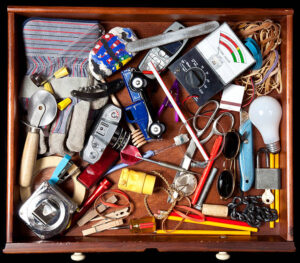Miscellaneous Thoughts (the Midwesterner’s junk drawer)

Everyone in the United States’ Midwest knows about the junk drawer. It’s that one drawer in your home full of random odds and ends, from batteries to old CDs to pens to tweezers. This will be my game audio information version of that—take it if you need it, discard it if you don’t.
Reference Track
My first few tunes were wayyyy too quiet. To me, they sounded at normal volume…because I cranked up the system volume on my laptop. When I uploaded them and played them on a different device set to normal volume levels, I could barely hear anything. Big oops. That’s why I suggest listening to a track you’re familiar with, then setting your computer volume to where it’s comfortable. From there, you have a reference point of how to adjust your own instruments’ volumes. Using a reference track for mixing/mastering is a common practice, and this is one quick use you can benefit from immediately. This will save you from blasting your virtual instruments into the red to get to a basic level, or experiencing the same quietness that I did.
ASIO
ASIO is an audio driver that is vastly superior to the Windows default. It allows you to set buffer sizes, which can help reduce latency. If whatever DAW you’re using doesn’t come with it, and you’re having issues with exporting clean audio or stuttering, give it a try. You can get it for free at ASIO4ALL.
Headphones/Earbuds
Some headphones/earbuds have onboard boosters to certain frequencies. You’ll see these marketed as “bass boosting” headsets or whatever. Avoid these when working on your game tracks if you can. You’ll be mixing with a skewed idea of how your music will sound on other devices. My first soundtrack was made with just Apple earbuds…for better or worse.
Contracts
The aim of this guide is to get you working on your first few projects, which will more than likely be small games made for free. You won’t need a contract for these hobbyist, feet-wetting, for-fun projects. If on the off chance you do get an offer to work on something that pays you, PLEASE get a contract together. I didn’t use a contract one time, and I was never paid. Big sad.
Mixing/Mastering
Start with no effects on anything, and slowly bring up each instrument to the volume level you want. Automation can be used to emphasize certain instruments at certain parts, as can tools like parallel compression (again, outside of the scope of this article). Don’t worry too much about mastering for your first few projects—just make sure you can hear the instruments you want when you want them to be heard, and don’t make things so loud that they clip.
Mistakes
You’ll make them. You’ll underestimate how long something will take you, you might not deliver all of the assets on time, life will get in the way and you’ll be out of town camping after forgetting you joined a game jam team (if you folks are reading this, I’m so sorry about that). It happens. The best thing you can do in situations like this is communicate. If it’s for a timed game jam, you might want to pass along the opportunity to a musician who is available and doesn’t have a team yet. If it’s for a developer’s hobby project, I’m sure they’ll understand and might even appreciate the extra time to do some tweaks on their end. If it’s for a professional project, you’ll have contingencies like this baked into your contract and business plan. Most people are extremely understanding when you communicate frequently and honestly.
On being ready
You’re ready now. You can read and watch tutorials on how to do stuff, but the best teacher will be the doing. The hardest part is taking the first step, and after that your momentum will naturally kick in. Be curious about everything, and don’t become disheartened if your first few pieces are lackluster—that’s how you learn. Indulge in the lackluster. Some of the best things you can do to improve are finishing pieces and reflecting on them. Finishing pieces teaches you that a lot of the time, creativity is just a matter of getting to work. Reflecting honestly (and asking others for their honest reflections) on what works and what doesn’t will do wonders toward your improvement.
On your own voice and artistic ethic
Some things that I wasn’t taught in school were asking what my personal voice is, and what my artistic ethic is. Make the music that you want to make, make the sounds that you believe in, and it will come. Collaboration can push you into positive discomfort, where you explore new sounds and approaches, but I think it’s vital to work on what you love and believe in. You don’t have to make music like everyone else is, and you shouldn’t (unless you want to and it feels alive for you)—that’s why it’s an art, not a science. Look at the soundtrack to Super Mario World: steel drums, banjo, tuba? Yes, please.
This conversation might be for when you step into the more professional space, but it’s important to step back and ask exactly what or who you’re working for. Would you feel comfortable working on a project full of micro-transactions and intentionally addictive gameplay loops? No one can answer these questions except for you. Really sit down with yourself and ask where you would draw the line, and respect your own integrity–your future self will thank you.
Projects that just…stop
This has happened to me quite a few times. You’re working on something and then…poof, the developer is gone. No communication, their social media accounts are deleted, your emails bounce back. It really, really sucks to put time and effort into something and end up ghosted. Because game jams are timed, there’s some expectation that you might not finish on time, so slightly expect it and don’t be too worried. There’s another jam right around the corner waiting for you. But for something long-term, it can really kill your momentum—I once took a year long break after getting burned this way. Some folks handle this problem by refusing to join developers until the middle or end of the development cycle so there’s a higher chance of a product actually being released. Surround yourself with dedicated, professional folks and you’ll also lessen your chances of the project disappearing. If it does happen to you, at least you have some tracks that could work for someone else, and more practice under your belt. Lean on your support system, grieve the loss, dust yourself off, and get back out there. “The best revenge is to not be like that.”
Save every project
Some of the first projects I worked on are no longer available, because the creator closed their account. I only have one of those projects saved. Seriously, if you can, make an archive of every project you’ve worked on in the beginning—they may suddenly disappear, and you’ll be out of luck when you’re putting together a portfolio.
